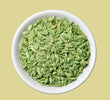
Timeless Role of Fennel Seeds: Culinary, Cultural, and Spiritual Significance
, by sandhya ejji, 4 min reading time

, by sandhya ejji, 4 min reading time
Fennel seeds have been valued for centuries for their culinary, cultural, and spiritual significance. From enhancing global dishes to symbolizing strength and protection in ancient cultures, these aromatic seeds continue to play versatile roles in cooking, gardening, and rituals.
Fennel seeds, derived from the fennel plant (Foeniculum vulgare), are tiny, aromatic seeds that play a significant role in various aspects of human culture beyond their health benefits. From culinary uses to cultural significance and applications in perfumery, fennel seeds have been valued for their versatility for centuries.
Historical and Cultural Significance of Fennel Seeds
Fennel seeds have been utilized since ancient times, particularly in Mediterranean and Indian cultures. Historically, the seeds were considered a symbol of strength and vitality. The ancient Greeks believed that fennel was a gift from the gods, as it grew in the region where Prometheus was said to have stolen fire from Mount Olympus. The seeds were also used in Roman celebrations and rituals, symbolizing prosperity and courage.
In medieval Europe, fennel seeds were commonly hung in doorways or windows to ward off evil spirits. This practice was especially prevalent during midsummer festivals. In Indian tradition, fennel seeds are considered to have cooling properties and are often used in religious rituals or given to guests after meals as a mark of hospitality.
Culinary Uses of Fennel Seeds
Fennel seeds have a robust, slightly sweet flavor reminiscent of anise, making them a staple in various global cuisines. Whether used whole, ground, or toasted, the seeds add complexity and depth to dishes.
Fennel Seeds in Gardening and Agriculture
Fennel plants are often grown not only for their seeds but also for their attractive foliage and flowers. The plant is a magnet for pollinators, making it a valuable addition to any garden designed to attract bees and butterflies. It’s often used in companion planting, as it helps repel certain pests, while its deep roots aerate the soil. Fennel’s feathery leaves and yellow umbels add visual interest to herb gardens and can also be used in flower arrangements.
From a commercial agriculture standpoint, fennel is cultivated in many countries for both its seeds and its essential oil. The seeds are harvested once they mature and are then processed for culinary or industrial use.
Beyond its culinary and agricultural uses, fennel seeds hold symbolic meaning in various spiritual practices. In some cultures, fennel seeds are believed to carry protective energy and are used in charms or amulets. In folk magic, fennel seeds are sometimes placed in bags and hung in doorways to guard against negative energies or ill intentions.
In meditation and ritual practices, fennel seeds are occasionally burned as incense to promote clarity of thought and enhance mental focus. The seeds' associations with renewal and strength also make them popular in practices aimed at fostering personal growth or overcoming challenges.
Conclusion
Fennel seeds are far more than a simple ingredient in the kitchen or a natural remedy for digestion. Their history is rich with cultural and spiritual significance, and their applications range from culinary delights to agricultural uses. From Roman soldiers chewing them for stamina to their modern-day presence in spice racks and herbal gardens, fennel seeds remain a versatile and valuable part of human life.